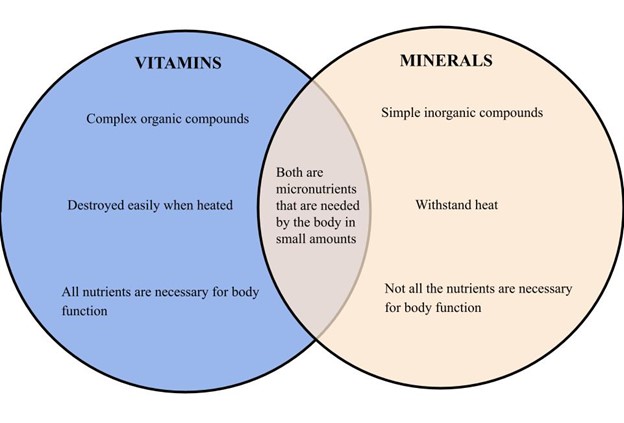Differences between Vitamins and Minerals
You know the nutritional benefits vitamins and minerals provide for the body, but do you know how to differentiate between them? And what makes one different form the other? It will sure be easier to differentiate them after reading this article. Vitamins and minerals are similar because they perform some of the same functions. These functions include boosting the immune system, helping cellular development and others. Your body cannot provide some of the vitamins and minerals it needs and eating a balanced diet is very important if you want to stay healthy. The significant difference between vitamins and minerals is that vitamins are made from plants and animals (organic) while minerals are obtained from inorganic materials like soil. Also, minerals hold on to their structure, but vitamins, on the other hand, can easily be broken down by physical means; this makes it easier to shuffle minerals into the body when compared with vitamins.
Vitamins
Vitamins are a group of organic compounds that the body can't synthesize but can only be gotten by eating nutritious foods. Vitamins are needed in small quantities for the growth of the cells and thus, the organs of the body. Our body needs 13 vitamins; the most vital of them are vitamin A, B, C, D, E and, K. Vitamins make bones stronger, help heal wounds, boost the immune system and keep the body active.
Minerals
Minerals are inorganic elements obtained from the food we eat or the natural environment (soil and water). The minerals needed by the body (essential minerals) include sodium, potassium, calcium, phosphorus, magnesium, and sulfur. Minerals that are needed in small quantities by the body and are referred to as microminerals. Micro minerals include iron, selenium, iodine, copper, zinc, and others. Our body needs minerals to stay healthy because minerals are essential in creating hormones and enzymes needed for our daily lives.
| Minerals | Vitamins | |
|---|---|---|
| Chemical composition | Complex organic compounds. | Simple inorganic compounds. |
| Vulnerability | Easily "destroyed" when heated. | Withstands heat. |
| Nutritional benefits | All nutrients are necessary for body function | Not all nutrients are necessary for body function. |

